Politics
Senate Candidate George V. Fried
March 1954: George V. Fried of Oklahoma City announced his candidacy for the U.S. Senate. His platform was, "If it's right, I'm for it."But when asked what ticket he planned to file on for the race, he replied, "It's none of your ________ business."
Two months later he was arrested, charged with passing an insufficient funds check for slightly over five dollars at a liquor store.
Sounds to me like he would have made a fine member of the U.S. Senate.

Great Bend Tribune - May 8, 1954
Posted By: Alex - Sat Sep 03, 2016 -
Comments (2)
Category: Politics, Strange Candidates, 1950s
The 1948 Democratic Convention Doves
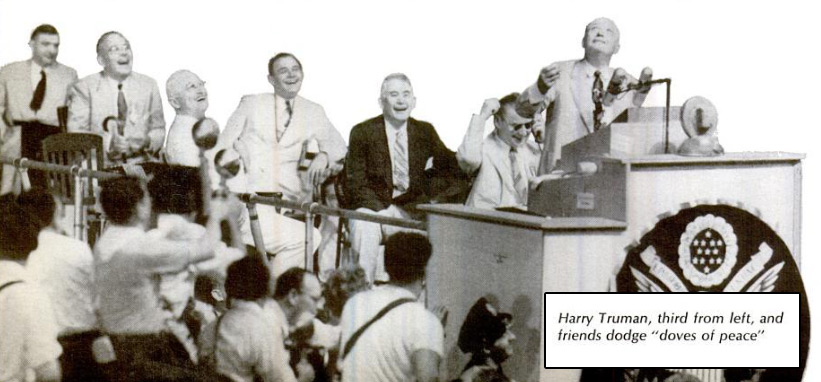
Image source: Life - July 5, 1968
The Democratic National Convention is currently underway in Philadelphia. The last time the Democrats held their convention in that city was back in 1948, when they nominated Harry S. Truman as the Democratic candidate.
It was a memorable convention in a number of ways (the first televised one, for instance), but among weird-news types it's remembered as the Convention where they decided to release 48 doves inside the convention hall. Zachary Karabell described the stunt in his book The Last Campaign: How Harry Truman Won the 1948 Election (2000) (via Presidential History Geeks):
"The problem was that the pigeons had been placed inside the bell hours before. By the time Miller brought the bell to the podium, two of the birds had died and the rest were desperate for relief from the heat. The minute she opened the cage, they darted out as fast as they could and flew directly toward the thirty-six inch pedestal fans that surrounded the stage. Sam Rayburn, the former Speaker of the House and chairman of the convention proceedings, started swatting at the low flying pigeons. His craggy voice carried to the radio and television microphones, and he could be heard shouting 'get those goddamned pigeons out of here!'
"But they could not be contained. One of them briefly came to rest on Rayburn's head, while another landed on the fan right next to Bess Truman. Other pigeons were flying toward the ceiling and, in their nervousness, started to splatter the delegates with droppings. Watching the absurd scene, Jack Redding turned to Congressman Mike Kirwan and said 'what damned fool could have thought of a thing like this? In this heat they all could be dead. It's bad enough having the Zionists, the Dixiecrats and the Wallace-ites after us, now we got to have somebody to arrange for the SPCA to have at us." By the time Truman came onstage, the surviving birds had retreated to the balconies and the overhead lights, where they watched as the president addressed the recently strafed delegates."
A more contemporary account comes from the Kokomo Tribune (July 28, 1948):
Weighing a neat 140 by Republican (conservative) scales, Mrs. Miller had stood on the platform, the personification of a buxom fairy queen, though without wand or wings. When she waved her lily white hand — Bingo! — a trap door in the bell opened and out flew four dozen of the scaredest pigeons you ever saw. They had been cooped up in that bell for several hours. Their bloodshot eyes popped out and their feathers were bedraggled by the humid 100-degree heat of the convention hall.
Some of the sturdier birds made for the high roof, but the feebler birds fluttered to the first perch they could light on — chairman Sam Rayburn's rostrum and the big electric fans that blew breezes over the speakers' platform. Everybody laughed. Then everybody ducked or threw their arms over their heads. Then everybody hollered or screamed.
The event caused one bard to dash off a quatrain:
Sing a song of Democrats, listen to them yell!
Eight and forty pigeons, parboiled in a bell.
When the bell was opened, the birds began to fly.
Wasn't that an awful thing to hit you in the eye?
Finally, it proved difficult to recapture all the doves.

The Decatur Daily Review - July 15, 1948
Posted By: Alex - Thu Jul 28, 2016 -
Comments (5)
Category: Politics, 1940s
The Price of Political Baseballs: An Update
Four years ago I posted about the comparative prices on eBay of baseballs signed by presidential candidates. I didn't make any predictions back then. However, Obama-signed baseballs were fetching higher prices than Romney-signed baseballs, and Obama won. Make of that what you will.So what does the political baseball market on eBay look like in this election year?

If you want a baseball signed by Donald Trump, they go for as low as $10.50 (above left) or as high as $2499.99 (above right). (There's one baseball signed by The Donald, Melania, and Ivanka for which the seller is asking $5000, but since that's 3 signatures it doesn't seem relevant for this data set.)
Gotta say, The Donald sure has a crazy signature! How do those zigzag lines spell out Donald Trump?

Hillary Clinton-signed baseballs can be bought for anywhere between $100.99 (left) and $2499 (right). Again, there are more expensive ones signed by both Hillary and Bill, but I'm only looking at individually signed baseballs here.
What conclusions can we draw from this? Well, the prices are much closer for Hillary vs. Donald than they were for Obama vs. Romney. Perhaps this indicates a closer race. However, Hillary baseballs aren't going for the very low prices that some Donald baseballs are going for. So maybe this indicates that Hillary has a slight advantage. Who knows! We'll find out in November.
Posted By: Alex - Wed Jul 27, 2016 -
Comments (6)
Category: Politics
Joel Slater, the Stateless Man
It's pretty common to hear people say that they're so disgusted with American politics that they're going to move to Canada and renounce their U.S. citizenship... especially if candidate X or Y wins the election. But people almost never follow through with this threat/promise.But Joel Slater did. Back in the Reagan era (1987), he became so angry at U.S. policies that he decided to renounce his American citizenship. The problem was that he did this without first arranging to acquire citizenship in another country. So he made himself stateless.
He was in Australia when he renounced his citizenship, and had assumed he would be able to stay there. But no, Australia promptly deported him to the U.S. Then, as a stateless person, he discovered that he was effectively trapped in the U.S. because he couldn't travel anywhere else without a passport. He managed to make it into Canada and Mexico a few times without a passport, but they both eventually shipped him back to the States. He also couldn't legally work without a social security number. So he became homeless, surviving on "odd jobs and the generosity of strangers."
After much begging and pleading, he was able to regain his U.S. citizenship in 1993.
More info: wikipedia
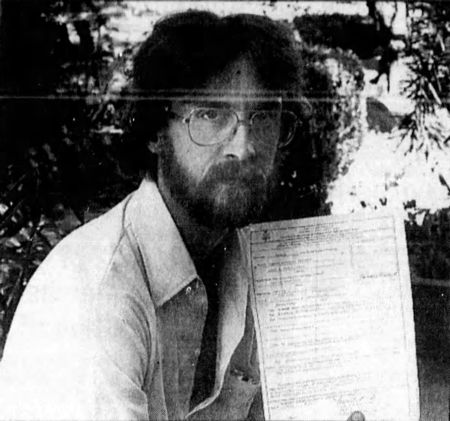
Slater showing off his "Certificate of Loss of Nationality of the United States"
Source: Arizona Republic - Mar 17, 1991
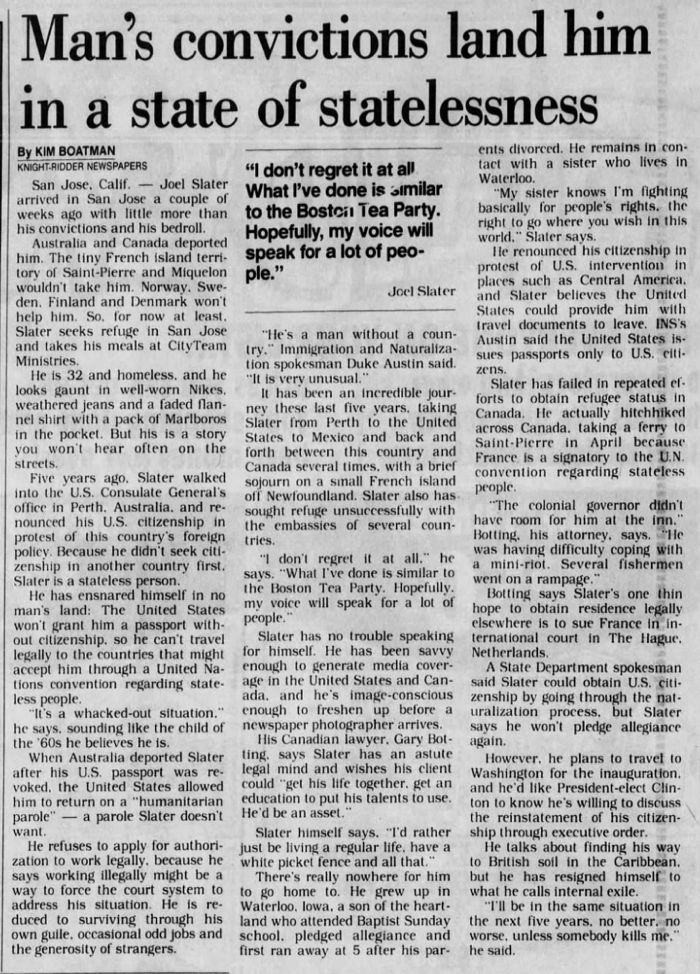
Indianapolis Star - Nov 27, 1992
Posted By: Alex - Sat Jun 04, 2016 -
Comments (7)
Category: Politics, Reformers, Do-gooders, Agitators and SJWs, Riots, Protests and Civil Disobedience, 1980s
Let Children Vote
Yesterday I posted about a proposal to disenfranchise the elderly. Here's a similar idea — a scheme to reduce the political power of grey hairs — but it goes about it in a different way. Instead of taking away the vote from the elderly, you give the vote to children. Their new political power would presumably balance out the influence of seniors, shifting state policy in new directions.This idea has been repeatedly advocated by Paul E. Peterson, professor of government at Harvard. He's argued for the idea in the journal Daedalus (Fall 1992), The Brookings Review (Winter 1993), and Education Next (Jan 2011).
The way it would work, in practice: "parents exercise the vote on behalf of their children... parents be given the option to assign the right to their child whenever they think he or she is capable of casting it on their own. That right, once given, can never be taken back."
The details that remain to be worked out: "Which parent gets the vote? What is to be done with election-day newborns? What proof of parentage is required?"
Peterson was not, by any means, the first to come up with the idea of letting children vote. Philippe van Parijs gives a brief history of the children's suffrage movement in his book Just Democracy:

Image source: The Brookings Review (Winter 1993)
Posted By: Alex - Wed May 18, 2016 -
Comments (11)
Category: Politics, Reformers, Do-gooders, Agitators and SJWs, Children
Elderly Should Lose Vote
Back in 1970, Douglas P. Stewart, a professor of classics at Brandeis University, made headlines for advocating that the elderly should lose the right to vote."The old, having no future, are dangerously free from the consequences of their own political acts, and it makes no sense to allow the vote to someone who is actuarially unlikely to survive and pay the bills for (what) he may help elect."
In other words, Stewart thinks old people vote with an attitude of "grand je serais mort, je me ficherais de tou — (when I'm dead, it (society) can go to hell)."
Stewart, if he's still alive, would now be around 83. I wonder if he's still voting?

The Daily Journal (Franklin, Indiana) — Sep 23, 1970
Posted By: Alex - Tue May 17, 2016 -
Comments (12)
Category: Elderly and Seniors, Politics, Elderly, 1970s
Weird Campaign Promises
Latest about.com article: A Brief History of Weird Campaign Promises.Example promises include:
- The elimination of poverty, after 10 pm. (Ferdinand Lop, 1940s)
- Pass a law to "keep them 'vine-ripened' stickers off of them mushy green tomatoes." (Connie Watts, 1960)
- Put joggers to good social use by forcing them to power treadmills to generate electricity. (Screaming Lord Sutch)
- Change the name of Aspen to "Fat City." (Hunter S. Thompson, 1970)
- Lose 50 pounds. (Adeline J. Geo-Karis, 1986)
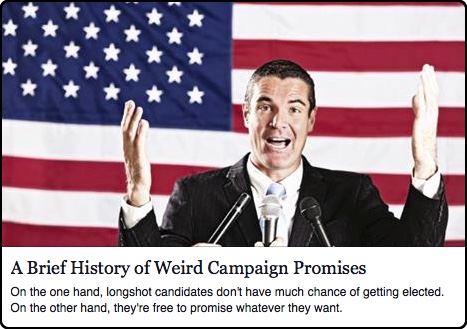
Posted By: Alex - Fri Mar 18, 2016 -
Comments (4)
Category: Politics
California’s Serious Draught
Scott Allen Meek is running for President, and he's not afraid to call attention to serious issues. For instance, right at the top of his campaign website he points out that "California is in it's 5th year of a Serious Draught."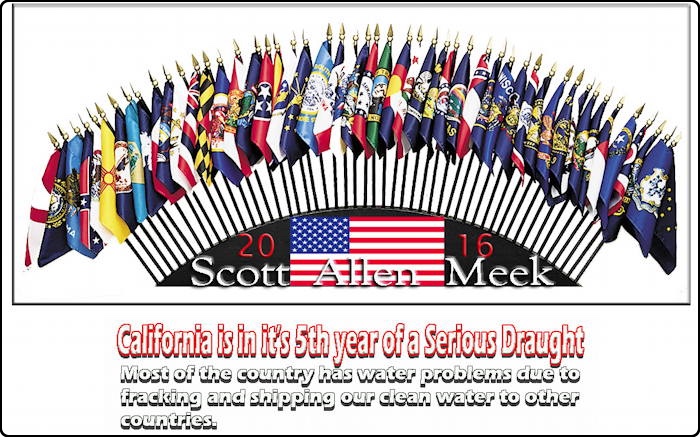
He's the only candidate I'm aware of who's ever drawn attention to this problem, but as a California resident, I can confirm that it's absolutely true. Sometimes it gets so draughty here that I have to put on a sweatshirt. And as someone who's spent quite a bit of time in the UK, I appreciate his use of the British spelling of the word.
Other issues important to Meek include the promotion of desalination and hemp farming.
Posted By: Alex - Sun Mar 13, 2016 -
Comments (6)
Category: Politics, Strange Candidates
Captain Tick-Mouse
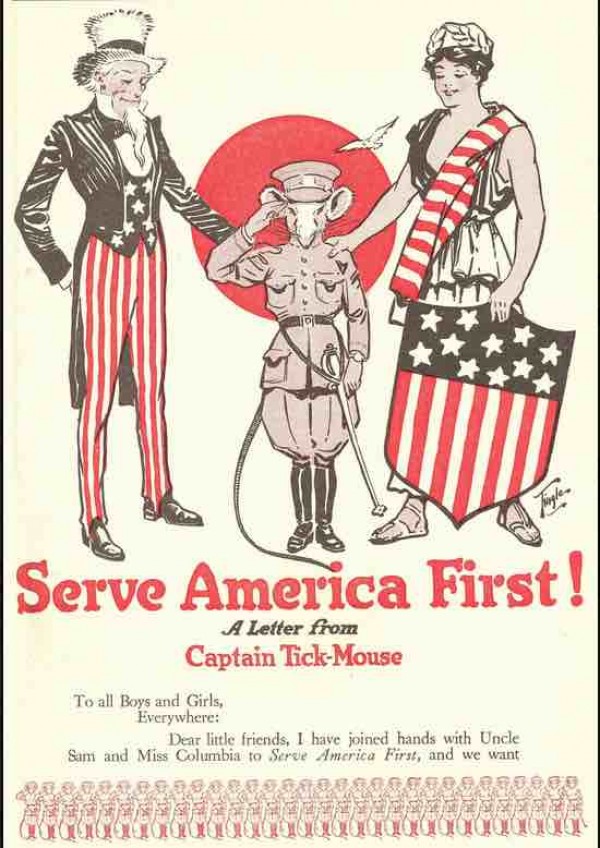
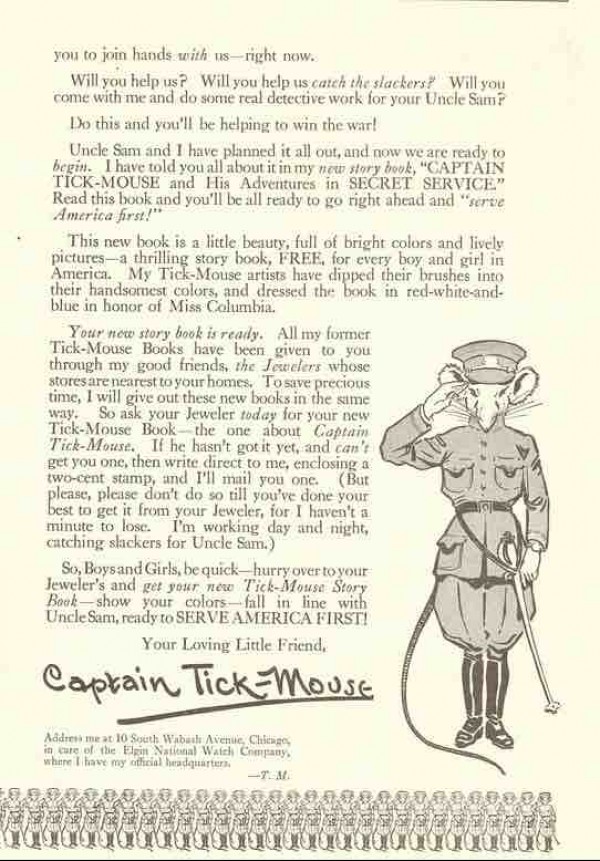
Original images here.
I am not sure having a rat-like figure as your patriotic icon is the best choice of imagery.
Here is a little background on the character, from this source.
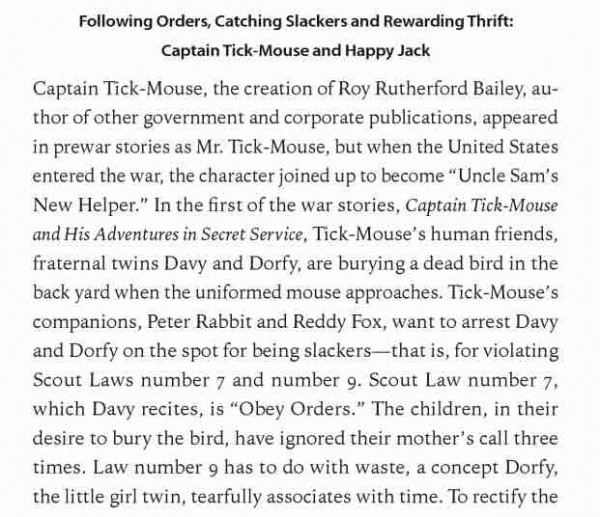
Posted By: Paul - Tue Dec 01, 2015 -
Comments (6)
Category: Anthropomorphism, Politics, Propaganda, Thought Control and Brainwashing, War, 1910s
Trumpkins
Donald Trump has become the theme of Halloween this year. People everywhere are creating pumpkins, aka Trumpkins, in his likeness. Some examples: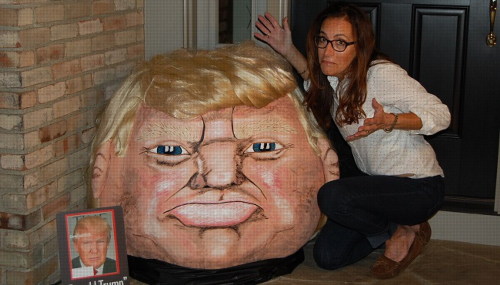
A 374-pound Trumpkin created by Jeanette Paras of Dublin, Ohio. wbtw.com
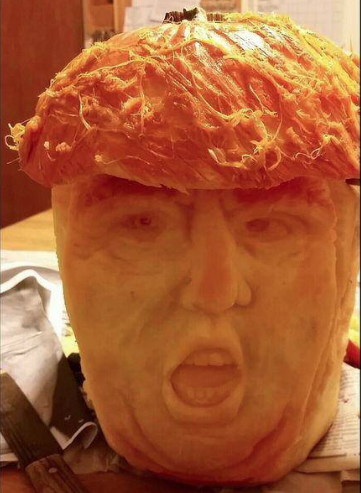
by Nancy Faber, via Twitter
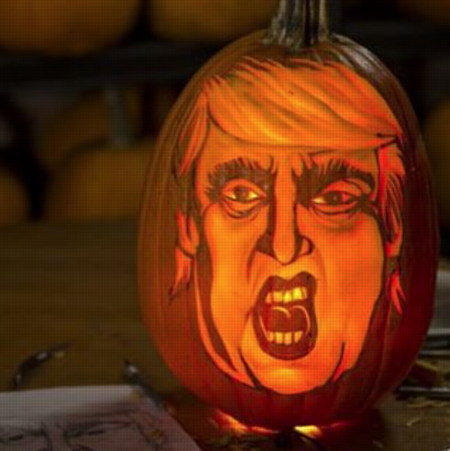
by billybush, via Instagram
Posted By: Alex - Wed Oct 28, 2015 -
Comments (5)
Category: Art, Holidays, Politics

| Who We Are |
|---|
| Alex Boese Alex is the creator and curator of the Museum of Hoaxes. He's also the author of various weird, non-fiction, science-themed books such as Elephants on Acid and Psychedelic Apes. Paul Di Filippo Paul has been paid to put weird ideas into fictional form for over thirty years, in his career as a noted science fiction writer. He has recently begun blogging on many curious topics with three fellow writers at The Inferior 4+1. Contact Us |




